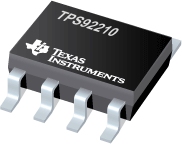Nov 23 2010
Semiconductor company, Texas Instruments has unveiled a new LED lighting pulse width modulation (PWM) controller for general lighting applications. The TPS92210 PWM controller is suitable for the applications, including display, architectural, light bulb replacement, troffer, residential recessed and commercial lighting.
 Single-Stage PFC LED Lighting Driver Controller
Single-Stage PFC LED Lighting Driver Controller
The reference design of the single-stage LED PWM controller can attain efficiency of 85%, enabling small, high-density form factor designs. The continuous linear TRIAC dimming feature of the device offers uniform, flicker-free control. In addition, the PWM controller attains a near unity power factor, and regulates LED current.
The TPS92210 has flexible operation modes including frequency modulation, constant on-time, and peak primary current. For enhanced efficacy, the constant on-time mode offers single-stage power factor correction, while the shutdown restart, full shutdown and programmable fault response offers flexibility for fault response.
The LED PWM controller has multiple protection functions, including advanced over current, thermal shutdown, and over voltage protection with no optocouplers, switches off the system when fault conditions are noticed. In addition, the cascoded MOSFET configuration of the controller leads to quick and convenient start-up and minimal switching losses of 10% compared to other devices.